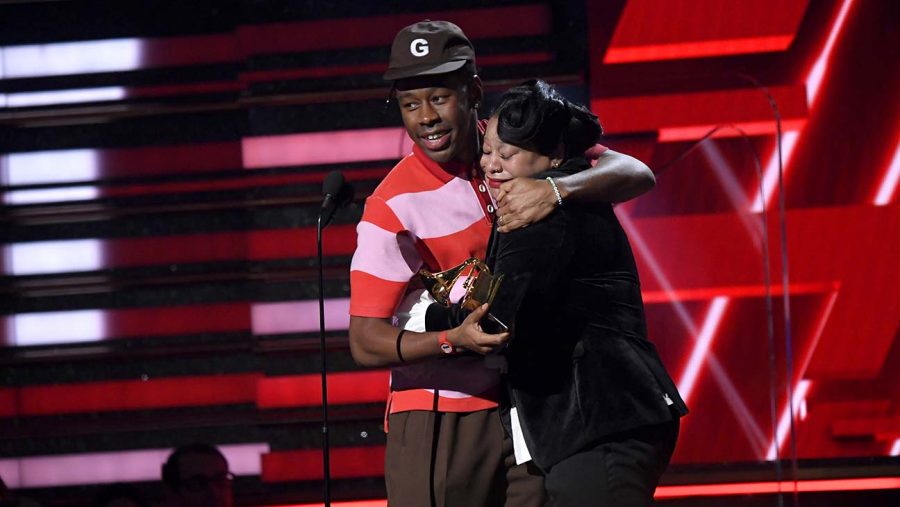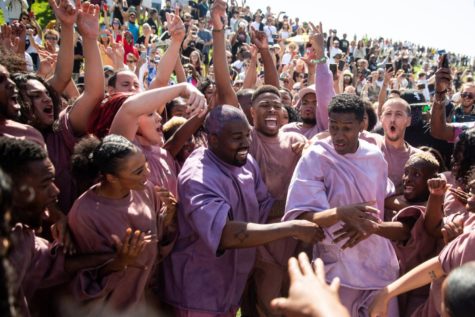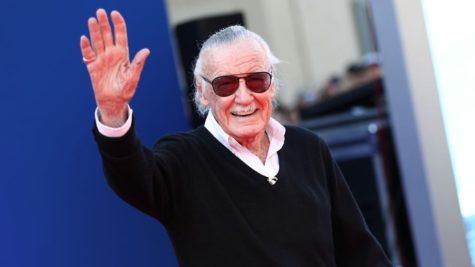2020 Grammys Review
LOS ANGELES, CALIFORNIA – JANUARY 26: (L-R) Tyler, the Creator and his mother accept the Best Rap Album award for ‘Igor’ onstage during the 62nd Annual GRAMMY Awards at Staples Center on January 26, 2020 in Los Angeles, California. (Photo by Kevork Djansezian/Getty Images)
May 7, 2020
The 2020 Grammys happened earlier this year, and, needless to say, history was made. Music’s biggest night made a big statement with many breakout artists and first-time nominees winning for the first time. I will be processing many elements of this year’s nominations, reporting the nominees/winners for general categories, highlighting certain artists’ personal achievements, and providing insight as to who was snubbed.
Possibly the biggest breakout star of 2019, Lil Nas X, received six Grammy nominations, many of which are for his smash hit single “Old Town Road”. Riding on the success of his chart-topping, record breaking, longest number one hit, the 20-year-old Atlanta hitmaker was nominated for Best New Artist, Record of the Year, Album of the Year, Best Pop Duo/Group Performance (with Billy Ray Cyrus), Best Music Video, and Best Rap/Sung Performance for his follow up single “Panini.” I had hoped for Nas to win both Best Music Video and Best New Artist, but he lost the latter nomination, winning Best Pop Duo/Group Performance instead. Had Nas won Best New Artist, it would have been a victory for the hip-hop genre and showed that the Grammys was slowly becoming more accepting, welcoming and acknowledging of the diversity of black, particularly rap, music.
18-year old global pop phenom Billie Eilish was up for six trophies as well, sharing Best New Artist, Album, and Record of the Year with Nas X, but also for Song of the Year, Best Pop Vocal Album, and Best Pop Solo Performance. Her debut album, “When We All Fall Asleep, Where Do We Go?” became one of the most commercially successful albums of the year and the decade. Eilish became the youngest female artist to top the Billboard Top 200 Albums chart in 10 years since Demi Lovato. She swept the Grammys this year, winning in all four major categories (Record, Album, Song of the Year, Best New Artist) in addition to Best Pop Vocal Album. I am annoyed by her Grammy sweep and think that she did not deserve most of her awards, especially because she just had huge hype around her in 2019, and because she is only 18 years old. She beat out music superstars like Ed Sheeran, Ariana Grande, Bon Iver, Khalid, Post Malone, and Taylor Swift. A novice so young and inexperienced in the music business should not be a benefactor of favoritism because she has such an emotional, melodramatic, sensitive fanbase who scream for her all the time.
Lizzo received a whopping eight Grammy nods, spanning categories from pop to urban contemporary to R&B. I thought she might not win any of them. While walking away from the Grammys empty-handed is nothing new, losing all eight nominations is a tough pill to swallow. Lizzo has experienced let-downs like this like when she lost 4 VMA and 3 AMA nominations. Being nominated for major awards in major categories is not enough; I feel that Lizzo has to win to truly get the credit she deserves. She eventually did, winning the Grammys for Best Urban Contemporary Album and Best Traditional R&B Performance.
While much of the buzz surrounds the big breakout artists in the major categories, I would like to review my personal favorite artists.
Global superstar and hip-hop genre bender Post Malone sought a win this year for his hit song “Sunflower” with Swae Lee. The 24-year-old rapper, whose real name is Austin Post, was snubbed at last year’s Grammys’s Album of the Year category, losing to Kacey Musgraves, a country artist I did not know existed until that night. “Sunflower” was nominated for Record of the Year and best Pop Duo/Group Performance. The latter category was stacked with industry heavy hitters: Malone and Lee were up against Ariana Grande & Social House (Boyfriend), the Jonas Brothers (Sucker), Shawn Mendes & Camila Cabello (Senorita), and of course Lil Nas X and Billy Ray Cyrus (Old Town Road). The Recording Academy did a very good job with stacking this category, but I had hoped that Posty would take home the trophy. He ultimately lost both nominations, but at least the song was recognized. The 24-year-old Texas rapper shot to meteoric fame within his first two years, topping the charts with multiple smash hits. One of them was Sunflower, a standout track from the Spiderman: Into the Spider-Verse movie soundtrack. The song charted at number one on the US Billboard Hot 100. Malone is very skilled at composing catchy and meaningful songs, and I wanted him to win Record of the Year because he did not win Album in 2019. Nonetheless, I know he will receive many more nominations and eventually some wins.
2-time Grammy nominee Tyler, the Creator finally got the recognition he deserves. Igor, his first number one album, won for Best Rap Album. While I am happy, I am shocked and disappointed that the album did not receive a nomination for Album of the Year, as it was more pop and synth influenced, conceptually amazing, and the production was brilliant.
Previous Grammy winners Chris Brown, Drake, Anderson .Paak, and Andre 3000 were all nominated together; Brown and Drake for “No Guidance” as Best R&B Song, and .Paak and Andre looked for a win with Best R&B Performance. Chris Brown and Drake are such huge artists, and Anderson .Paak has such an element of soul in his music that I admire that I hoped one of them was going to win; but PJ Morton ended up taking home the Grammy. Not knowing PJ Morton, I suppose it is good that he won instead of being overshadowed and drowned out by music industry heavyweights and rap superstars; besides, my R&B favorite Anderson .Paak dominated the category, winning for Best R&B Album and Best R&B Performance, which satisfies me. Morton’s win shows that the Grammys, to some extent, values promoting lesser-known artists as equals.
English singer James Blake’s 2019 Album Assume Form received a Grammy nod for Alternative Music Album. When I listened to the album, the one word I could use to describe it was “different”. When I first listened to Assume Form, I was sitting down in my living room, expecting to hear the same melancholy, voice-wavering tunes I had previously heard from him before. I was hit with a contour of vibrantly abstract electro pop; eccentrically alternative, IGOR style production; and Blake’s reassuring, calming voice. Listening to the album was such a surreal experience, I felt like the waves of the ocean were surrounding me, crashing around me but not hurting me, but me still wondering how those waves could still exist. I had never listened to music that sounded like anything on Assume Form. I was very happy when I saw Blake was nominated. I wanted him to win, because his album was a conceptual masterpiece; but he lost to Vampire Weekend’s Father of the Bride. Father of the Bride is not an album in the category that I listened to, neither are all the others except Assume Form; so I am quite biased and disappointed that Blake did not win.
One thing I credit the Grammys with is filling the rap categories with great artists, many of which are new. Best Rap Performance nominated J. Cole for “Middle Child”; Charlotte breakout and 2019 XXL Freshman DaBaby for “Suge”; Cole’s label Dreamville for an ensemble performance of “Down Bad” featuring J.I.D., Bas, EarthGang, Young Nudy; the late Nipsey Hussle, Roddy Ricch and producer Hit-Boy for the 2019 anthem “Racks In The Middle”; and power duo Offset and Cardi B for “Clout”. While I wanted Offset to win, Nipsey Hussle took home the posthumous trophy.
Hussle’s win may be seen as triumphant in many eyes, but it attracts and references controversy within the Recording Academy and Grammy nominations committees. I know Hussle’s family and close collaborators Roddy Ricch and Hit-Boy feel deep gratefulness for receiving the award; they, along with other rap heavyweights like Meek Mill, Mustard and DJ Khaled, were part of a small circle of artists and producers who were intimately close with the late rapper. But 2 Grammys is not worth anything after the artist is gone; a golden trophy will never bring Nipsey Hussle back after he was murdered; it will at most numb the pain and bring those who were close to him temporary relief. Let it not be forgotten that Hussle was nominated and attended the Grammys last year, while he was alive; his debut and final studio album, Victory Lap, was up for the award for Best Rap Album, eventually losing to Cari B’s Invasion of Privacy, another controversial win that viewers and fans debated should have gone to Travis Scott for “Astroworld” (a view which I fully support and am enraged about not happening) or Mac Miller for Swimming. By the time of the event, Miller had been dead for 5 months, and his parents had flown out to the show in his place. Forcing bereaved parents to operate in a setting that might make them sentimental and bring up painful memories, and, on top of that, force them to watch their dead son lose while they are in the room, is too much emotional and cruel torture for any member of the Recording Academy to put a parent though. That being said, I can only wonder if the way the Grammys treated Miller’s loss influenced Nipsey’s win; perhaps Hussle’s wins were only fueled by his death. Had he been alive, I speculate that the Grammys would not have let him win.
Tracks like “Higher” (DJ Khaled, John Legend, Nipsey Hussle), “Drip Too Hard” (Lil Baby & Gunna), “Panini” (Lil Nas X), “Ballin” (Mustard featuring Roddy Ricch), and “The London” (Young Thug, J. Cole, Travis Scott) were all in the running for the Best Rap/Sung Performance. I favor “Drip Too Hard” out of all these tracks; it would have felt like an underdog story if the two Atlanta artists won music’s biggest award in their breakout year for their breakout track. Controversially, Higher, another Nipsey Hussle record, won.
Maryland native YBN Cordae along with 3-time Grammy winner and Chicago icon Chance the Rapper sought a win for Best Rap Song with “Bad Idea”. The song competes with Rick Ross and Drake’s “Gold Roses”, 21 Savage & J. Cole’s “A Lot”, previously mentioned “Racks In The Middle”, and DaBaby again for “Suge”. While I hate to see DaBaby lose both his nominations, I was rooting for “A Lot”. The song, produced by DJ Dahi and J. White did it, is off Savage’s 2018 LP I Am > I Was. I congratulate 21 Savage and J. Cole on their first ever Grammy wins.
Perhaps the most prestigious Grammy rap award is Best Rap Album. It is my favorite award to watch for and the one that means the most to me. The nominees were J. Cole & Dreamville’s compilation album “Revenge Of The Dreamers III”, Meek Mill’s “Championships”, Savage’s “I Am > I Was”, Tyler, The Creator’s “Igor”, and YBN Cordae’s “The Lost Boy”. I deliberated about who I wanted to win the most in this category, and I am ecstatic with the fact that Tyler won. The Best Rap Album award has a special place in my heart; it is my favorite Grammy award and I anticipate and get excited over it the most when the show airs live. 2019 was a successful year for rap music, and every nominee for this award was well-placed. Revenge, Championships, I Am > I Was, The Lost Boy, and Igor all represented the best parts of rap: raw and intricate storytelling, choice beat productions, lyrical dexterity, and melodic flow. Based on this analysis of the rap nominees, I think the J. Cole’s label supergroup Dreamville deserved the award. The album boasted soulful production, master storytelling, and the amount of Dreamville artists per song coupled with numerous guest features created an opportunity to exhibit numerous patterns, flows and cadences. While I am happy he won a well-deserved Grammy for an incredible body of work, this leads to a deeper, greater discussion about hip-hop’s place in the Grammys structure. Tyler was placed in a setting that did not fit his project, which is something he expressed in his post-Grammys interview. Nevertheless, it was the only category the Grammys selected for him. Keep in mind that IGOR shot to the number one spot on the Billboard Hot 100, shutting out DJ Khaled’s mega star-studded album, Father of Asahd. The production on the album was very synth-infused and poppy, and so creative and alternative; I really expected it to win Album of the Year, or at least be nominated. This shows that the Grammys still mistreats, ignores, and improperly acknowledges African American artists and rappers, and still believes that the only category for them to be put in is the hip-hop/rap box.
Perhaps unexpected news to many, Former First Lady Michelle Obama was nominated for and won a Grammy – yes, you read that right – for Best Spoken Word Album. Her book, Becoming, became the best-selling U.S. book of 2018 after only 15 days, and was met with much acclaim. This comes as a great delight to me and anyone else who loves Michelle too. Though she made an appearance at last year’s show, the former First Lady was not there to pick up her award this year. She continues to make history, as she had now become a part of a small group where a husband-wife couple both win Grammys: her husband 44th president Barack Obama accumulated two trophies in 2006 and 2008 for Dreams From My Father, and The Audacity of Hope, respectively. Though it feels so unexpected that such an award would be bestowed upon her, Michelle’s win makes me ecstatic.
While the long list of nominees does not disappoint fans and critics of music, many snubs did occur. Perhaps the most culturally relevant moment of 2019, Lil Nas X’s “Old Town Road” failed to receive a Grammy nomination for Song of the Year. That doesn’t make sense at all. The country-rap ballad was a genre-bending, record-breaking smash hit, the most popular song of 2019, and the longest number one on the Billboard Hot 100 (19 consecutive weeks). As to why this happened I do not know. I reckon the song failed to get the recognition for the same reasons the Billboard country charts took the song down: because of these corporation’s internalized racism and resentment of hip-hop elements. This problem has long existed in the Grammys award-giving framework: members of Recording Academy nomination committees snubbing African American artists of major awards reflecting their widely celebrated music and giving them predominantly white, pop artists. This pattern started a couple of years ago. In 2016, Taylor Swift won Album of the Year for her album 1989, prompting massive outrage from fans of Compton rap great Kendrick Lamar for overlooking his 2015 project To Pimp a Butterfly. Fans felt the same way in 2017, when pop megastar Adele won for her album 25, instead of Beyonce’s Lemonade. Even 2018 albums like Kendrick Lamar’s DAMN. and Jay-Z’s 4:44, and 2019 projects like the Black Panther soundtrack and Drake’s Scorpion lost out to more forgettable albums like Bruno Mars’s 24K Magic and Kacey Musgrave’s Golden Hour, respectively. Some controversial winners have even protested, like Adele who broke her Grammy in half so she could share with Beyonce. Whatever the reason behind these decisions is, it is definitely fueled by a misunderstanding, unappreciation, and improper categorization of black music.
The second-most disappointing snub: Tyler, the Creator’s Igor was not nominated for album of the year, nor was its lead single “Earfquake” nominated for Song of the Year. The 2019 project displayed musical creativity, ingenuity, and brilliance. Even though it did secure a nomination for Best Rap Album, I do not consider it the best of rap, or think it belongs there; Revenge of the Dreamers III should win that award. If Tyler had been nominated, he for sure would have had a good chance of winning.
The third most irritating snub for me was for Machine Gun Kelly’s alternative rock anthem, “I Think I’m Okay”. The Yungblud and Travis Barker-assisted track has been streamed over one hundred million times on Spotify, and was certified gold. Kelly, whose real name is Colson Baker, was quite upset that he did not receive a nomination for Best Rock Performance or Best Rock Song nod; he Tweeted: “would’ve been cool for Hotel Diablo or ‘I think I’m OKAY’ at least to get acknowledged by the award shows”. I do not listen to rock music, but this was one of the greatest songs I have ever heard.
Other questionable snubs include Lil Dicky (Best Music Video, Song of the Year: Earth), Meek Mill (Best Rap Song & Best Rap Performance: Going Bad ft. Drake), Jonas Brothers (Album of the Year: Happiness Begins), Gunna & Dababy (Best New Artists), Offset (Best Rap Album: Father of 4), and Taylor Swift and Ed Sheeran (Album of the Year: Lover, No. 6. Collaborations Project).
The conclusion of music’s biggest night left many artists in high spirits, as the thrill of winning golden gramophones boosted their career. But the awards show highlights the deeper, obscure, underlying themes about snubs (especially those fueled by racism), unfair sweeps, posthumous wins, hip-hop and rap representation and proper acknowledgment, recognition of alternative music in all its forms. This year’s Grammys was representative of a larger social commentary and dismissal of issues in our society, and with this year’s biggest night in music now over, we can only anticipate what this year will produce musically, and envision who might get properly acknowledged for their diversity, without discrimination, next year.






